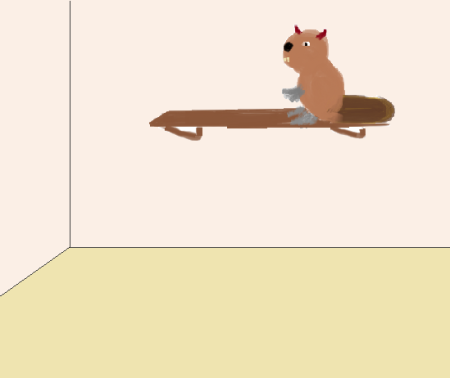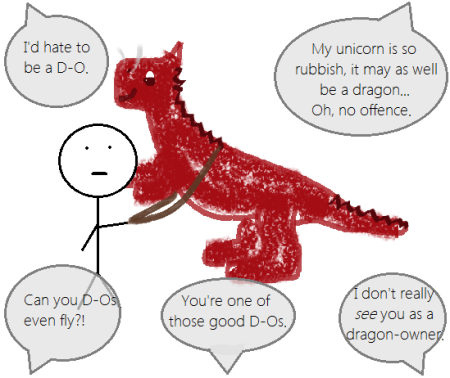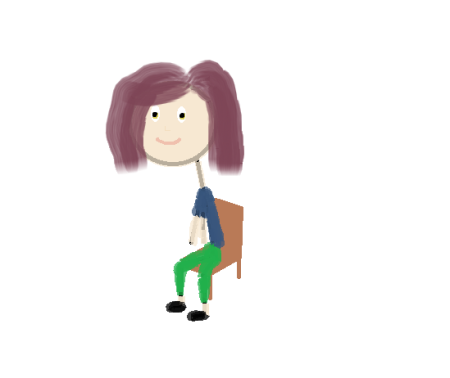I often wonder how strangers view me. I imagine it's something like this.
Okay, so the hair colour is wishful thinking. Additionally, in my own mind I look far more awkward and far less desirable, but I'm trying to shelve the Beaver of Half-Truths for now.

I try not to give too much thought to how strangers view me. On the other hand, acquaintances, friends and people who have the ability to make an impact on my life are much more important.
I love people. I'm recovering from social anxiety disorder, and actually being able to socialise is a recently discovered joy. I cannot describe how freeing it feels to have an open conversation with somebody, despite how difficult I still find it.
Presenting myself to other people, however, does not come without its perils.
I sometimes wonder how acquaintances view me. I imagine it's something like this.
Developing a closer relationship with a person involves filling in a lot of those gaps. It may seem like I tend to focus conversation on the distinguishing parts of my life, but if I don't explain the context of my words and actions then I risk being misunderstood. I risk being perceived as lazy, rude and a liar.
We all make assumptions. It is easiest to assess a social situation (and, from an evolutionary perspective, to judge if people are dangerous), if you have a 'standard' model with which to compare others. The issue is that if I asked most people, out of context, to imagine the standard model of a human being - it would probably look a lot like this.
I don't know about you, but that doesn't describe me. If people try to gage my personality by matching me up to those traits, then I come off pretty badly. More pressingly, I come off as incredibly boring.
Imagine we live in a world were everybody owns a unicorn; it's your mode of transport, it's your main source of support and you're its companion. At the age of 5, as oft happens, your unicorn turns into a dragon. I'm sure this is a scenario we can all relate to.
People generally don't have a problem with dragons. They're a bit afraid of them, because they are so used to unicorns and have heard that dragons can be unpredictable, but social acceptance is on the up. There are also laws in place to make sure that dragon owners aren't discriminated against.
Still, you feel lonely, and as if your identity as a dragon owner is invisible and invalid. You are made to feel like The Other; as though you are not only a deviation, but a deviant.
You are alienated from peers.
You are alienated from learning.

You are alienated from the media.

You are alienated from popular opinion.

This is why we need women's and black history months - because white men are disproportionately visible throughout taught history. This is why we need LGBTQ pride events - because straight people have never been told they should feel ashamed of being straight. This is why we need 'reasonable adjustments' for disabled people - because the able bodied live in a world that was built with them in mind.
It's not the fault of the D-Os that all the parking spaces are for unicorns. It is not unreasonable to request that parking spaces cater for all mythological creatures.
Speaking as somebody who has grown up with white privilege, I used to think that the best way to tackle racism was to be 'colour blind'. I would go to great lengths to describe the physical appearance of a person without mentioning skin colour, and would try to view all people through my own lens. After all, I am human, my experiences are human experiences, therefore other people must be coming from the same human point, right?
I now realise that by doing this was white washing all the experiences of black people. I was assuming that my lens - my white lens - was the neutral human one.

By not viewing black people as black people, I was, by default, trying to view them as white.
Black is not a dirty word. Likewise, disabled is not a dirty word, neither is gay, or fat or skinny or female or trans or any other adjectives humans apply to themselves. They are merely descriptors, providing a explanatory short-cut for how we relate to the world. Of course it would be nice to think that, one day, we will no longer need to label ourselves. Until then, it's important to show the world that these varied identities exist - and that they are no less valid. Let's celebrate our different normalities rather than celebrating conformity to this idea of a 'standard' model!
Occasionally wonder how my friends see me. I hope it's something like this.
I am all of these things and more. I won't dilute my experiences. To let others assume that I am anything different - to transmogrify myself so that I can be understood next to the 'standard' model - is to do me a disservice. I am not putting a horn on my dragon and banning it from breathing fire. This is my normality. What's yours?
Yours uniquely (just like everybody else),
BT





No comments:
Post a Comment
Tick my boxes, baby, and leave me a comment...